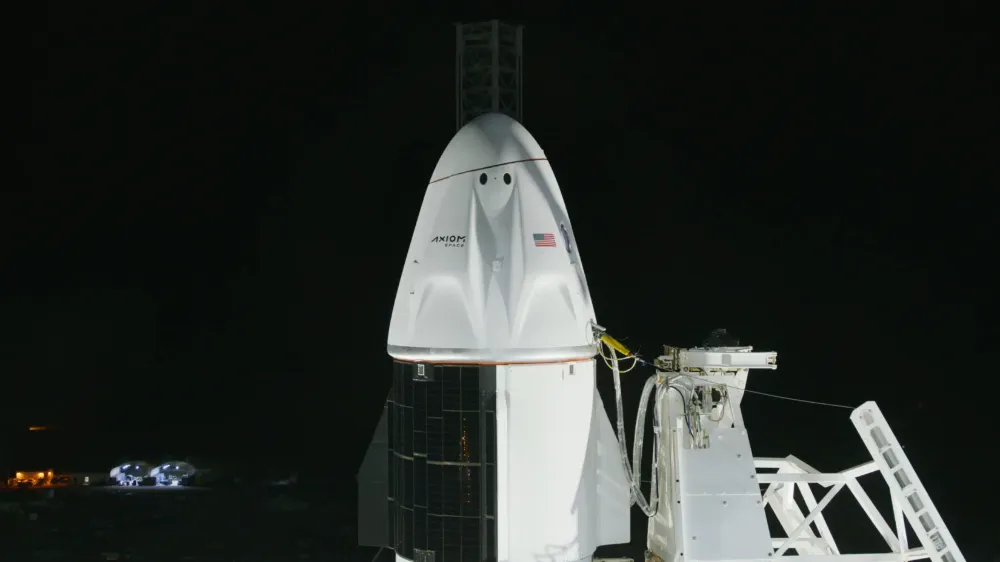A Smooth Arrival at the ISS
SpaceX’s Dragon capsule “Grace”, part of the Axiom-4 private mission, docked safely with the International Space Station (ISS) on June 26, 2025. This marks another major achievement in commercial space travel, strengthening international cooperation in space exploration.
Launch Journey from Earth
The mission lifted off from NASA’s Kennedy Space Center on June 25, 2025, at 2:31 a.m. EDT. Riding aboard the reliable Falcon 9 rocket, the four-person crew began their 28-hour journey to the ISS.
The launch was previously delayed due to technical issues, including a liquid oxygen (LOx) leak in the rocket and a minor pressure concern at the ISS. However, once these issues were resolved, the spacecraft launched smoothly without any further problems.
The Capsule Named “Grace”
This mission marked the maiden voyage for the Dragon capsule designated C213, affectionately named “Grace” by the crew while in orbit. During the docking process, Commander Peggy Whitson shared a cheerful message:
“Grace is happy to be on Harmony.”
Successful Docking Process
At approximately 6:31 a.m. EDT, Grace successfully performed a soft docking at the zenith port of the ISS’s Harmony module, the space-facing side of the station. Over the next two hours, the capsule completed alignment, hard capture, leak checks, and system connections.
By 8:14 a.m., the hatches were opened, and the crew floated into the station, warmly greeted by the current Expedition 73 team, which includes astronauts from NASA, JAXA, and Roscosmos.
A Mission of Many Firsts
This mission is historic for several reasons:
- Shubhanshu Shukla becomes the first Indian astronaut to enter the ISS.
- Sławosz Uznański-Wiśniewski from Poland and Tibor Kapu from Hungary are the first astronauts from their respective countries to visit the ISS.
- Veteran astronaut Peggy Whitson breaks her own U.S. record for total time in space, now logging more than 675 days across five spaceflights.
14 Days of Research and Collaboration
The Axiom-4 crew will spend about two weeks on the ISS conducting over 60 scientific experiments. These include studies in microgravity, biotechnology, space medicine, and technological demonstrations designed by scientists from over 30 countries.
Highlights of the research include:
- Shubhanshu Shukla’s Indian-led experiments on plant growth, microalgae, radiation effects, and artificial intelligence in space operations.
- European and Hungarian experiments focusing on space health and material sciences, aimed at advancing research for future missions.
Axiom Space’s Vision for the Future
This flight marks Axiom Space’s fourth private astronaut mission as the company moves closer to building a commercial space station that will eventually replace the ISS. Axiom plans to launch its first independent modules later this decade.
Meanwhile, SpaceX continues to prove the reliability of its reusable rockets. The Falcon 9 booster from this launch successfully landed back on Earth, adding to SpaceX’s impressive record of recovery missions.
Looking Ahead: A New Era of Space Travel
The arrival of Dragon Grace at the ISS symbolizes more than a technical success—it represents a new era of international cooperation and commercial spaceflight. As the crew works alongside their ISS counterparts, their mission will contribute valuable scientific insights and pave the way for future private space missions.
For now, Grace remains docked at the Harmony module, embodying the spirit of unity, progress, and humanity’s shared journey beyond our planet.





More Stories
U.S. Congress Warns Trump: Tariffs on India Risk Strategic Partnership
Under‑Construction Tower Collapses in Chennai, Nine Missing After Disaster
From Ice Stupas to Isolation: Sonam Wangchuk Detained Amid Ladakh Turmoil